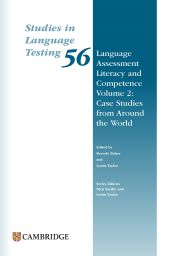
Language Assessment Literacy and Competence Volume 2: Case Studies from Around the World
Edited by Beverly Baker and Lynda Taylor
Interest in and academic literature on language assessment literacy (LAL) have grown rapidly in recent years. This volume is one of a pair of complementary titles designed to expand the perspectives of the current literature and to incorporate multiple viewpoints from this area of research.
Volume 2 brings together a collection of case studies that represent the diversity of players and approaches to developing language assessment competence and knowledge around the world.
This volume provides:
- an exploration and reflection of the concept of case study, specifically applied to LAL research
- a series of projects and initiatives that each represent cases in a distinctive way
- through these cases, valuable insights into the nature and development of LAL.
Language assessment is widely used for educational purposes, professional employment and migration/citizenship. As some awareness of LAL becomes ever more critical in education and wider society, this volume will be a rich resource for academic researchers and graduate students, as well as for language test developers, teachers, teacher trainers, policymakers, and other decision-makers involved in the use of language assessment.
Download a free full pdf version of this volume
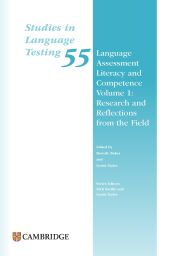
Language Assessment Literacy Volume 1: Research and Reflections from the Field
Edited by Beverly Baker and Lynda Taylor
Interest in and academic literature on language assessment literacy (LAL) have increased rapidly in recent years. This volume is one of a pair of complementary titles designed to expand the perspectives of the current literature and incorporate multiple viewpoints from this area of research.
Volume 1 brings together LAL research studies with diverse stakeholder constituencies from around the world to share some important findings and approaches. The empirical research chapters are supplemented with a set of insightful reflections on the actual process and experience of learning about language assessment from very personal perspectives.
This volume provides:
- an up-to-date review of relevant literature on LAL
- a comprehensive and detailed exploration of recent empirical research in this area in different contexts and with diverse stakeholder groups
- valuable reflective insights into the nature and development of LAL.
Language assessment is widely used for educational purposes, professional employment and migration/citizenship. As some awareness of LAL becomes ever more critical in education and wider society, this volume will be a rich resource for academic researchers and graduate students, as well as for language test developers, teachers, teacher trainers, policymakers, and other decision-makers involved in the use of language assessment.
Download a free full pdf version of this volume
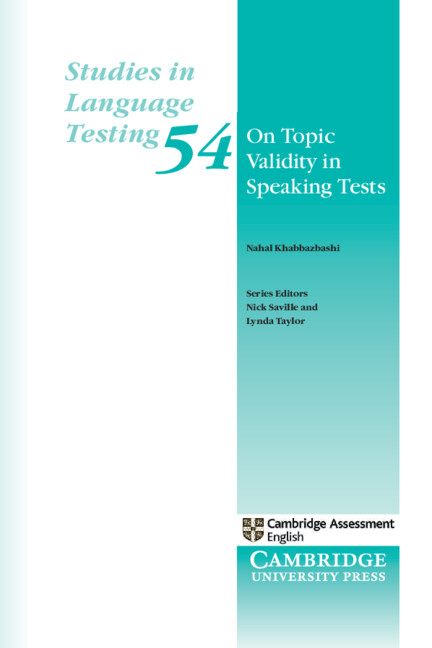
On Topic Validity in Speaking Tests
Nahal Khabbazbashi
Topics are often used as a key speech elicitation method in performance-based assessments of spoken language, and yet the validity and fairness issues surrounding topics are surprisingly under-researched. Are different topics ‘equivalent’ or ‘parallel’? Can some topics bias against or favour individuals or groups of individuals? Does background knowledge of topics have an impact on performance? Might the content of test taker speech affect their scores – and perhaps more importantly, should it? Grounded in the real-world assessment context of IELTS, this volume draws on original data as well as insights from empirical and theoretical research to address these questions against the backdrop of one of the world’s most high-stakes language tests.
This volume provides:
- an up-to-date review of theoretical and empirical literature related to topic and background knowledge effects on second language performance
- an accessible and systematic description of a mixed methods research study with explanations of design, analysis, and interpretation considerations at every stage
- a comprehensive and coherent approach for building a validity argument in a given assessment context.
The volume also contributes to critiques of recent models of communicative competence with an over-reliance on linguistic features at the expense of more complex aspects of communication, by arguing for an expansion of current definitions of the speaking construct emphasising the role of content of speech as an important – yet often neglected – feature.
This volume will be a valuable resource for postgraduate students, those working professionally in the field of speaking assessment such as personnel in examination boards, item writers and curriculum developers, and anyone seeking to better understand and improve the fairness and validity of topics used in assessments.
Download a free full pdf version of this volume
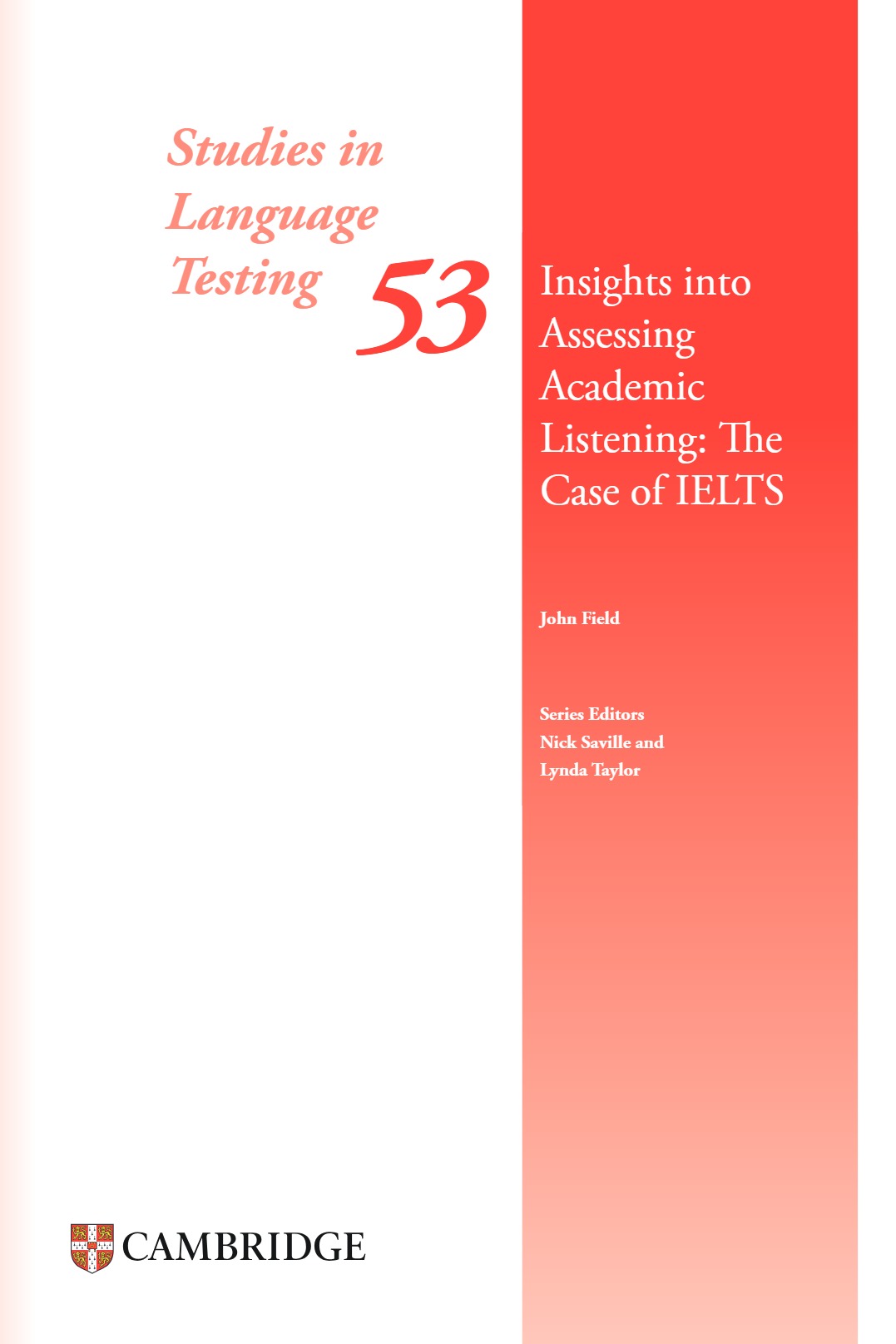
Insights into Assessing Academic Listening: The Case of IELTS
John Field
Opening with an overview of studies that investigate the listening test component of the International English Language Testing System (IELTS), this volume proposes and illustrates a new line of enquiry for academic listening assessment: a better understanding of the cognitive processes underlying everyday listening events can provide a framework for recognising what is distinctive about the skill when applied to an English for Academic Purposes (EAP) or professional context. The outcome is a set of validation criteria against which a reviewer can measure to what degree a given test does or does not represent the academic or professional experience, which can be applied across various features of a listening test and to the design of all similar tests in this field.
This volume provides:
- an up to date review of relevant literature on assessing academic listening
- a clear and detailed specification of the construct of academic listening, with an evaluation of how this is used for assessment purposes
- a consideration of the nature of academic listening in a digital age, and its implications for assessment research and test development
As test developers need to support score validity claims with a sound theoretical framework which guides their coverage of appropriate language ability constructs, this volume will be a rich resource for examination boards and other institutions, as well as researchers and graduate students in the field of language assessment, and teachers preparing students for IELTS or involved in EAP programmes.
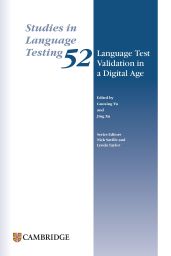
Language Test Validation in a Digital Age
Edited by Guoxing Yu and Jing Xu
Technology has become an important resource for improving and redefining methods of assessment and research. This volume focuses on the uses of cutting-edge technologies in language test design and validation. Using Professor Cyril J Weir’s socio-cognitive framework (2005) as a basis, a diverse range of contributors explore the potential and limitations of applying innovations in data collection such as eye tracking and keystroke logging to language assessment research, and address the validity issues arising from the use of artificial intelligence such as automated scoring and automated feedback in language test development and delivery. In addition, the volume reflects on how fit-for-purpose the socio-cognitive framework is for language assessment research and practice in light of technological advances.
With contributions from Japan to Europe to the USA, this new addition to the SiLT series will guide readers through the crucial changes that technology, as an integral part of the construct of assessment and an innovative tool for test design and validation, is bringing to the language testing landscape.
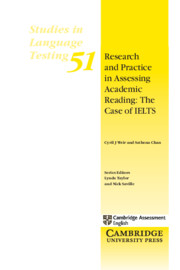
Research and Practice in Assessing Academic Reading: The Case of IELTS
Cyril J Weir and Sathena Chan
This volume describes differing approaches to understanding academic reading ability that have emerged in recent decades and goes on to develop an empirically grounded framework for validating tests of this skill. The framework is then applied to the IELTS Academic Reading module to investigate a number of different validity perspectives that reflect the socio-cognitive nature of any assessment event. The authors demonstrate how a systematic understanding and application of the framework and its components can help test developers to operationalise their tests so as to fulfill the validity requirements for an academic reading test.
The book provides:
- an up to date review of the relevant literature on assessing academic reading
- a clear and detailed specification of the construct of academic reading and evaluation of how this is used for assessment purposes
- a consideration of the nature of academic reading in a digital age and its implications for assessment research and test development.
The volume is a rich source of information on all aspects of testing academic reading ability. Examination boards and other institutions who need to validate their own academic reading tests in a systematic and coherent manner, or who wish to develop new instruments for measuring academic reading, will find it a useful resource, as will researchers and graduate students in the field of language assessment, and teachers preparing students for IELTS (and similar tests) or involved in English for Academic Purposes (EAP) programmes.
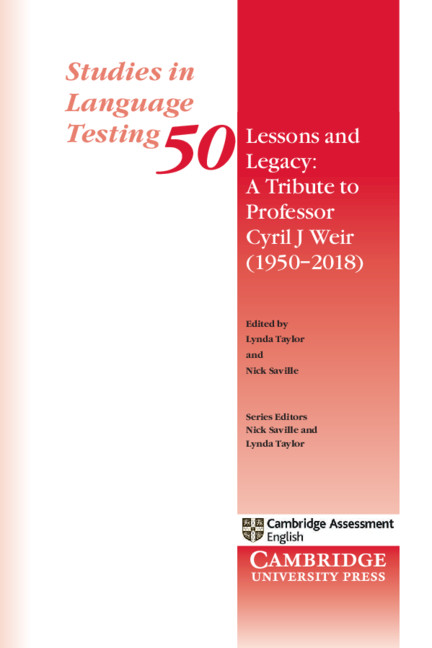
Lessons and Legacy: A Tribute to Professor Cyril J Weir (1950-2018)
Edited by Lynda Taylor and Nick Saville
Written by a selection of his friends and collaborators, this volume pays tribute to the academic achievements of the late Professor Cyril J Weir. His passing in September 2018 leaves an eclectic legacy in the field of language testing and assessment, and the chapters contained herein, part of a series he guided and often wrote for, honour and illuminate his lessons.
Professor Weir’s chronicling of the history and evolution of language testing is reflected in chapters on his role in assessment reform and the origins of his socio-cognitive framework; authors also reflect on the impact of this model on test validity and validation. He was also a vital influence in putting these ideas into action, as reported in chapters on test operationalisation and the establishment of the Centre for Research in English Language Learning and Assessment (CRELLA).
By drawing on a rich range of voices in language assessment, from China to the UK to the Middle East, and from Professor Weir’s earliest to most recent collaborators, we illustrate breadth and depth of his impact on language testing and assessment, and how his lessons continue to be relevant to the present day.
Download a free full pdf version of this volume
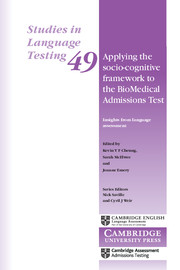
Applying the Socio-cognitive Framework to the BioMedical Admissions Test: Insights from language assessment
Edited by Kevin Y F Cheung, Sarah McElwee and Joanne Emery
This volume takes a framework for validating tests that was developed in language testing, and applies it to an admissions test used for biomedical courses. The framework is used to consider validity in the BioMedical Admissions Test (BMAT). Each chapter focuses on a different aspect of validity and also presents research that has been conducted with the test. By addressing all of the validity aspects identified as important by language testers, this volume presents a comprehensive evaluation of BMAT's validity. The processes of evaluation used in the book also promote a cross-disciplinary approach to assessment research, by demonstrating how effectively language testing frameworks can be used in different educational contexts. The authors of the chapters include Cambridge Assessment staff and medical education experts, from a wide range of subject backgrounds. Psychologists, clinicians, linguists and assessment experts have all contributed to the volume, making it an example of multidisciplinary collaboration.
The Cambridge approach to admissions testing (Nick Saville)
Considering the test taker in test development and research (Devine, Taylor and Cross)
Cognitive validity (Cheung and McElwee)
Building fairness and appropriacy into testing contexts Tasks and administrations (Shannon, Crump and Wilson)
Scoring validity (Elliott and Gallacher)
Criterion-related validity (Fyfe, Devine and Emery)
Consequential validity (McElwee, Fyfe and Grant)
Conclusions and Recommendations (Cheung)
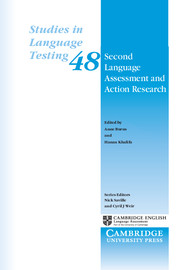
Second Language Assessment and Action Research
Edited by Anne Burns and Hanan Khalifa
This volume brings together a collection of chapters outlining the principles and processes of action research and providing case studies of practitioner action research completed by teachers in the ELICOS (English Language Intensive Courses for Overseas Students) sector in Australia. The Action Research in ELICOS programme in which the teachers participated was an innovative collaboration between English Australia, the professional body for ELICOS, and Cambridge English Language Assessment commencing in 2010 and continuing to the present. An introductory chapter describes the initiation of the programme and the professional model adopted to support and facilitate the teachers' research, while a concluding chapter considers the impact of the programme on the teachers and on the ELICOS sector more generally. Case studies by the teachers present the action research processes they undertook to research receptive and productive skills and assessment of these skills in their classrooms.
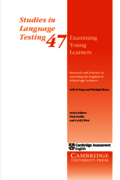
Examining Young Learners: Research and practice in assessing the English of school-age learners
Szilvia Papp and Shelagh Rixon (2018)
The unique areas of children and teenagers’ second language development and assessment is given a state-of-the-art account in this volume. Common issues in cognitive psychology, child second language (L2) acquisition studies, recent research on adolescents, and language assessment are explored by linking research carried out within the educational, academic and testing communities.
The volume reflects on how learners’ L2 development between the ages of 6 and 16 can be coherently described and their L2 assessment defined in terms of socio-cognitive validity. There is particular focus on the theoretical foundations, language competence model, development and validation framework, and evaluation and review processes to provide evidence for the validity of the Cambridge English family of assessments for children and teenagers.
Academics, assessment professionals and postgraduate researchers of L2 development in children and teenagers will find great value in the volume’s theoretical insight, while policy-makers and teachers will gain rigorous practical advice for the young language learner’s classroom and assessment.
Order a copy
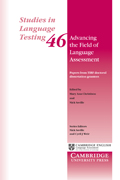
Advancing the Field of Language Assessment: Papers from TIRF doctoral dissertation grantees
Edited by MaryAnn Christison and Nick Saville (2016)
Since 2002, the International Research Foundation for English Language Education (TIRF) has supported students in completing their doctoral research on topics related to the foundation’s priorities. Each year applicants who have been advanced to candidacy in legitimate PhD or EdD programmes are invited to submit proposals for Doctoral Dissertation Grants (DDGs).
This volume brings together a set of 11 TIRF-related research papers on English language assessment. As a member of the TIRF Board of Trustees, Cambridge English wishes to support the foundation in achieving its aims in disseminating and influencing language testing policies.
The volume
- focuses on the applied nature of research in language assessment
- discusses the implications of such research, and
- presents its findings from a global perspective.
This volume can serve as a core or supplemental text for graduate seminars in English language assessment in applied linguistics, education, TESOL, and TEFL, and it is useful for scholars of L2 methodology, curriculum design, and teacher development in ELT, as well as for courses on language assessment. As a reference volume, it is appropriate for individual scholars, test developers, graduate and undergraduate students, and researchers.
Order a copy
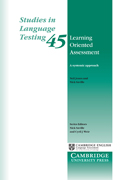
Learning Oriented Assessment: A systemic approach
Neil Jones and Nick Saville (2016)
The learning-oriented approach to assessment developed in this book seeks to exploit the commonality as well as the complementarity of formal assessment and classroom assessment. It proposes a Learning Oriented Assessment (LOA) model which presents a systemic, ecological approach in which all kinds of assessment contribute positively to their two major educational purposes: promoting better learning and measurement and contributing to a meaningful interpretation of learning outcomes.
The volume poses three key questions central to LOA: ‘What is learning?’, ‘What is to be learned?’, and ‘What is to be assessed?’, and discusses how a focus on these fundamental aspects of learning and assessment can support learners, teachers and assessment professionals. The volume also focuses on the use of evidence and on how it can be collected and used to feed back into learning. It overviews large-scale assessment as practised by Cambridge English and learning-oriented classroom assessment practices, which is where learning interactions take place. The volume concludes with a look at implementing LOA in practice.
This volume is a rich source of information on key issues, principles and practices in the area of LOA. It provides fresh insights into current knowledge and understanding of the role of assessment in supporting learning, as well as useful guidance on good practice. As such, it will be of considerable interest to assessment practitioners, teachers and academics, educational policy-makers and examination board personnel.
Download a free full pdf version of this volume
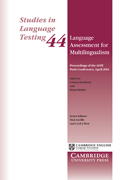
Language Assessment for Multilingualism: Proceedings of the ALTE Paris Conference, April 2014
Edited by Coreen Docherty and Fiona Barker (2016)
This volume explores the role of multilingualism in social, educational and practical contexts. It brings together a collection of edited papers based on presentations given at the 5th International Conference of the Association of Language Testers in Europe (ALTE) held in Paris, France, in April 2014.;
The selected papers focus on several core strands addressed during the conference.
Section 1 deals with frameworks in social contexts and focuses on their role in migration and multilingual policy and practice. It addresses how recent education reforms aim to increase both social mobility and intercultural communication. Section 2 focuses on the response of language assessment providers to the rise of linguistic diversity. Section 3 then discusses the role of intercultural professionalisation of language assessors. Finally, Section 4 reflects on the approach of various institutes to achieve fairness and quality in test provision.
Key features of the volume include:
- insights on the effect of multilingualism on international mobility
- discussion of how multilingualism can address the challenge of increasing linguistic diversity
- reflection on the impact of intercultural communication on linguistic competence
- advice on how to ensure fairness and quality in language assessment.
With its broad coverage of key issues and combination of theoretical insights and practical advice, this volume is a valuable reference work for academics, employers and policy-makers in Europe and beyond. It is also a useful resource for postgraduate students of language testing and for practitioners, and anyone else seeking to understand the policies, procedures and challenges encountered in the application of multilingualism.
Order a copy
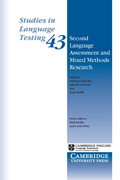
Second Language Assessment and Mixed Methods Research
Edited by Aleidine J Moeller, John W Creswell and Nick Saville (2016)
Test developers have a responsibly to ensure that the assessments they develop meet the needs of test users and provide a fair assessment in educational and social contexts. Mixed methods research plays an important role in providing a set of different but complementary research tools which can be used to underpin the assessment validation process and add value to assessment research.
The purpose of this volume is to create a deeper understanding of the role of mixed methods in language assessment, and to provide essential information needed to conduct and publish mixed methods research within the context of language assessment. Mixed methods language assessment studies on topics such as community-based participatory test development, investigating test impact, developing new test tasks and rating scales, illustrate first-hand the benefits and added value of mixed methods to the language testing and assessment field.
Key features of the volume include:
- theoretical insights and practical guidance on the use of mixed methods research
- advice on the essential components for conducting and publishing mixed methods research
- case studies from language assessment to demonstrate how mixed methods research can be rigorously and systematically applied in a specific context.
This is the first volume of its kind to comprehensively illustrate the application of the principles of mixed methods research in language assessment and to combine theoretical insights and practical illustrations of good practice. As such, it is a valuable reference work for academics, postgraduate students and practitioners, and anyone else seeking to understand the purpose, design and application of mixed methods research.
Order a copy
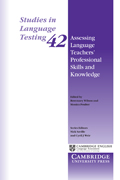
Assessing Language Teachers’ Professional Skills and Knowledge
Edited by Rosemary Wilson and Monica Poulter (2015)
The growth in English language teaching worldwide, and the related increase in teacher training programmes, have made it more important than ever for greater accountability in the assessment of teachers. Formal, summative assessment has taken on greater importance in many teacer training programmes and requires procedures which do not always sit easily with the development process. Meanwhile, transparency of assessment procedures is also increasingly demanded by the candidates themselves.
This edited volume discusses key issues in assessing language teachers’ professional skills and knowledge, and provides case study illustrations of how teacher knowledge and teaching skills are assessed at pre-service and in-service levels within the framework of the Cambridge English Teaching Qualifications.
The volume provides:
- discussion of ways in which the changing nature of English language teaching has impacted on teacher education and assessment
- useful illustrations of specific assessment procedures for both teaching knowledge and practical classroom skills
- real-life examples of the ways in which the Cambridge English Teaching Qualifications have been integrated into and adapted to work in local contexts.
This is the first volume of its kind wholly dedicated to language teacher assessment. As such, it will be of interest not only to researchers and postgraduate students but also language teachers and teacher educators.
Order a copy
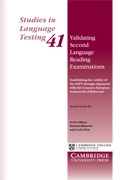
Validating Second Language Reading Examinations
Establishing the validity of the GEPT through alignment with the Common European Framework of Reference
Rachel Wi-fen Wu (2014)
Validating Second Language Reading Examinations describes the development of an empirical framework for test validation and comparison of reading tests at different proficiency levels through a critical evaluation of alignment with the Common European Framework of Reference (CEFR). It focuses on contextual parameters, cognitive processing operations and test results, and identifies parameters for the description of different levels of reading proficiency examinations. The volume explores procedures for linking tests to the CEFR and proposes both qualitative and quantitative methods that complement the procedures recommended in the Council of Europe’s Relating Language Examinations to the Common European Framework of Reference for Languages (CEFR): A Manual, piloted in 2003 and revised in 2009.
Key features of the volume include:
- a detailed review of the literature on CEFR alignment, vertical scaling, test specifications and test comparability
- a comprehensive and coherent approach to the validation of reading tests
- an accessible and systematic description of procedures for collecting validity evidence
- a case study comparing different testing systems targeting the same CEFR level.
This volume will be a valuable resource for academic researchers and postgraduate students interested in using CEFR alignment procedures and methodology to demonstrate differentiation across different levels of a testing system and equivalence between different examinations that target a particular CEFR level. It will be of particular relevance to exam boards who wish to validate their reading tests in terms of differentiation across test levels and external criteria. It will also be a useful reference for teachers and curriculum designers who wish to reflect real-life reading activities when they prepare reading tasks for language learning.
Order a copy
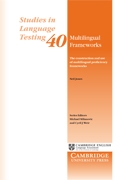
Multilingual Frameworks: The construction and use of multilingual proficiency frameworks
Neil Jones (2014)
This volume describes 20 years of work at Cambridge English to develop multilingual assessment frameworks and presents useful guidance of good practice. It covers the development of the ALTE Framework and ‘Can Do’ project, the Common European Framework of Reference (CEFR) and the linking of the Cambridge English exam levels to it, Asset Languages – a major educational initiative for UK schools, and the European Survey on Language Competences, co-ordinated by Cambridge English for the European Commission. It proposes a model for the validity of assessment within a multilingual framework and, while illustrating the constraints which determined the approach taken to each project, makes clear recommendations on methodological good practice. It also explores and looks forward to the further extension of assessment frameworks to encompass a model for multilingual education.
Key features of the volume include:
• a clear and comprehensive explanation of several major multilingual projects
• combination of theoretical insights and practical advice
• discussion of the interpretation and use of the CEFR.
Multilingual Frameworks is a rich source of information on key issues in the development and use of multilingual proficiency frameworks. As such, it will be a valuable reference work for academics, education policy-makers and examination board personnel. It is also a useful resource for postgraduate students of language assessment and for practitioners, and any stakeholders seeking to gain a clearer picture of the issues involved with cross-language assessment frameworks.
Order a copy
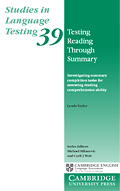
Testing Reading through Summary: Investigating summary completion tasks for assessing reading comprehension ability
Lynda Taylor (2013)
Testing Reading through Summary explores the use of summary tasks as an effective means of assessing reading comprehension ability. It focuses in particular on text-removed summary completion as a task type that offers a way of addressing more directly the reader’s mental representation of text for reading assessment purposes.
The volume describes a series of empirical studies that investigated the development of text-removed summary completion tasks, their trialling and validation with results from an independent measure of reading ability. Findings from the project suggested that it is possible to develop a satisfactory summary of a text which will be consistent with most readers’ mental representation if their reading of the text is adequately contextualised within some purposeful activity.
Key features of the book include:
- an in-depth discussion of the nature of reading comprehension and approaches to assessing reading comprehension ability
- a comprehensive empirical report and practical guidance on the development, trialling and validation of summary completion tasks
- fresh insights into current knowledge and understanding of the assessment of reading ability.
This volume will be a valuable resource for those working professionally in the field of reading assessment such as key personnel in examination agencies and those with an academic interest in language testing/examining. It will also be a useful resource for postgraduate students of language testing and for practitioners, i.e. teachers, teacher educators, curriculum developers, materials writers, and anyone seeking to better understand the nature of reading comprehension ability and how it can be assessed most effectively.
Order a copy
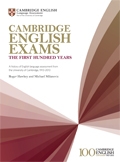
Cambridge English Exams – The First Hundred Years
A history of English language assessment from the University of Cambridge 1913-2013
Roger Hawkey and Michael Milanovic (2013)
The first Cambridge English examination for non-native speakers was taken by three candidates in 1913. Today, the exams are taken by nearly four million people a year in 130 countries and cover a wide range of needs, from English for young learners to specific qualifications for university entrance and professional use. Throughout their history, the Cambridge English exams have been designed to meet the changing needs of learners, teachers, universities, employers and official bodies, and to deliver educational and social benefits. They have benefited from - and contributed to - research in education, language learning and assessment to ensure that they offer valid, reliable and fair qualifications. This book traces the history of the exams through their first hundred years, setting them in the context of wider educational and academic developments. The authors pay particular attention to the contribution of the dedicated individuals in Cambridge and around the world who have contributed to the success of the exams and to their positive educational impact. It will be of interest to anyone interested in language teaching and assessment, applied linguistics or educational history, and to the thousands of people who are part of the wider Cambridge English network.
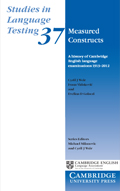
Measured Constructs: A history of Cambridge English language examinations 1913-2012
Cyril J Weir, Ivana Vidaković and Evelina D Galaczi (2013)
This volume sheds light on how approaches to measuring English language ability evolved worldwide and at Cambridge over the last 100 years. The volume takes the reader from the first form of the Certificate of Proficiency in English offered to three candidates in 1913, a serendipitous hybrid of legacies in language teaching from the previous century, up to the current Cambridge approach to language examinations, where the language construct to be measured is seen as the product of the interactions between a targeted cognitive ability based on an expert user model, a highly specified context of use and a performance level based on explicit and appropriate criteria of description.
This volume:
- chronicles the evolution of constructs in English language teaching and assessment over the last century
- provides an accessible and systematic analysis of changes in the way constructs were measured in Cambridge English exams from 1913- 2012
- includes copies of past Cambridge English exams, from the original exams to the current ones, as well as previously unpublished archive material.
Measured Constructs is a rich source of information on how changes in language pedagogy, together with wider socio-economic factors, have shaped the development of English language exams in Cambridge over the last century. As such, it will be of considerable interest to researchers, practitioners and graduate students in the field of language assessment. This volume complements previous historical volumes in the series on the development of Cambridge English exams, as well as titles which investigate language ability constructs underlying current Cambridge English exams.
Order a copy
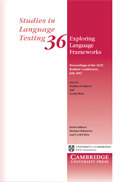
Exploring Language Frameworks: Proceedings of the ALTE Kraków Conference, July 2011
Edited by Evelina D Galaczi and Cyril J Weir (2013)
This volume explores the role of language frameworks in social, educational and practical contexts. It brings together a collection of 21 edited papers based on presentations given at the 4th International Conference of the Association of Language Testers in Europe (ALTE) held in Kraków in July 2011. The selected papers focus on several core strands addressed during the conference. Section one deals with frameworks in social contexts and focuses on their role in migration and multilingual policy and practice. Section two addresses the use of frameworks in educational contexts and addresses issues such as defining an inclusive framework for languages, the use of frameworks in test and course development and their role in guiding test users. Section three focuses on practical issues associated with the application of frameworks and presents studies associated with rating scales, the use of frameworks in test development and validation, and the role of statistical procedures as part of quality assurance.
Key features of the volume include:
- insights into the influence of language frameworks on social policy and practice
- up-to-date information on the application of frameworks in a variety of learning and teaching contexts worldwide
- accounts of recent projects involving the practical role of frameworks in addressing assessment issues.
With its broad coverage of key issues and combination of theoretical insights and practical advice, this volume is a valuable reference work for academics, employers and policy-makers in Europe and beyond. It is also a useful resource for postgraduate students of language testing and for practitioners, and anyone else seeking to understand the policies, procedures and challenges encountered in the application of language frameworks.
Order a copy
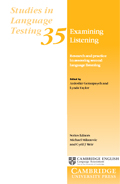
Examining Listening: Research and practice in assessing second language listening
Edited by Ardeshir Geranpayeh and Lynda Taylor (2013)
This volume develops a theoretical framework for validating tests of second language listening ability. The framework is then applied through an examination of the tasks in Cambridge English listening tests from a number of different validity perspectives that reflect the socio-cognitive nature of any assessment event. The authors show how an understanding and analysis of the framework and its components can assist test developers to operationalise their tests more effectively, especially in relation to the key criteria that differentiate one proficiency level from another.
The book provides:
- an up-to-date review of the relevant literature on assessing listening
- an accessible and systematic description of the different proficiency levels in second language listening
- a comprehensive and coherent basis for validating tests of listening.
This volume is a rich source of information on all aspects of examining listening ability. As such, it will be of considerable interest to examination boards who wish to validate their own listening tests in a systematic and coherent manner, as well as to academic researchers and graduate students in the field of language assessment more generally. This is a companion volume to the previously published Examining Writing (2007), Examining Reading (2009)and Examining Speaking (2011).
"Geranpayeh and Taylor have put together a collection that will undoubtedly become a significant addition to the literature on a still very under-represented skill."
Luke Harding (2015), Language Testing 31, 121-124.
Order a copy
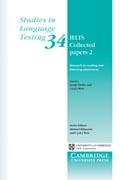
IELTS Collected Papers 2: Research in reading and listening assessment
Edited by Lynda Taylor and Cyril J Weir (2012)
IELTS (International English Language Testing System) serves as a high-stakes proficiency test to assess the English language skills of international students wishing to study, train or work in English-speaking environments. The test has been regularly revised in light of findings from ongoing research and validation studies to ensure that it remains a valid and reliable measure.
This volume brings together a set of research studies conducted between 2005 and 2010, sponsored under the auspices of the British Council/IELTS Australia Joint-funded Research Program, which provides annual grant funding to encourage research activity among IELTS test stakeholders around the world. The eight studies – four on reading and four on listening assessment – provide valuable test validity evidence and directly inform the continuing development of the IELTS Reading and Listening tests.
The volume chronicles the evolution of the Reading and Listening tests in ELTS and IELTS from 1980 to the present day. It explains the rationale for revising these tests at various points in their history and the role played in this by research findings. The editors comment on the specific contribution of each study in this volume to the ongoing process of IELTS Reading and Listening test design and development.
This is a companion volume to the previously published IELTS Collected Papers on IELTS speaking and writing assessment. It will be of particular value to language testing researchers interested in IELTS as well as to institutions and professional bodies who use IELTS test scores. It will also be relevant to students, lecturers and researchers working more broadly in the field of English for Academic Purposes.
Order a copy
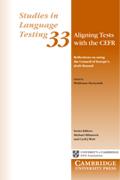
Aligning Tests with the CEFR: Reflections on using the Council of Europe’s draft Manual
Edited by Waldemar Martyniuk (2010)
This volume contains 12 case studies that piloted the Council of Europe’s preliminary Manual for Relating Language Examinations to the Common European Framework of Reference for Languages (CEFR), released in 2003. The case studies were presented at a 2-day colloquium held in Cambridge in December 2007, an event which helped to inform the Manual revision project during 2008/2009. As well as describing their studies and reporting on their findings, contributors to the volume reflect and comment on their experience of using the draft Manual. A clear and comprehensive introductory chapter explains the development of the CEFR and the draft Manual for linking tests, discussing its relevance for the future. The volume will be of particular interest to examination boards, language test developers and educational policy makers, as well as to academic lecturers, researchers and graduate students interested in the principles and practice of aligning tests with the CEFR.
‘This volume … is another excellent book in the Studies in Language Testing (SiLT) series … This volume of papers will serve as an excellent resource for professionals around the world who wish to learn how to go about the difficult task of aligning their assessments with the CEFR.’
Craig Deville (2012), Language Testing 29 (2), 312–314.
Order a copy
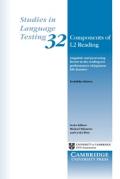
Components of L2 Reading: Linguistic and processing factors in the reading test performances of Japanese EFL learners
Toshihiko Shiotsu (2010)
This volume investigates the linguistic and processing factors that underpin the reading comprehension performance of Japanese learners of English. It describes a comprehensive and rigorous empirical study to identify the main candidate variables that affect reading performance and to develop appropriate research instruments to investigate these. The study explores the contribution to successful reading comprehension of factors such as syntactic knowledge, vocabulary breadth and reading speed in the second language. Key features of the book include: an up-to-date review of the literature on the development and assessment of L1 and L2 reading ability; practical guidance on how to investigate the L2 reading construct using multiple methodologies; and fresh insights into interpreting test data and statistics, and into understanding the nature of L2 reading proficiency. This volume will be a valuable resource for academic researchers and postgraduate students interested in investigating reading comprehension performance, as well as for examination board staff concerned with the design and development of reading assessment tools. It will also be a useful reference for curriculum developers and textbook writers involved in preparing syllabuses and materials for the teaching and learning of reading.
Download a free full pdf version of this volume
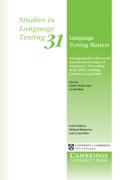
Language Testing Matters: Investigating the wider social and educational impact of assessment – Proceedings of the ALTE Cambridge Conference, April 2008
Edited by Lynda Taylor and Cyril J Weir (2009)
This volume explores the social and educational impact of language testing and assessment by bringing together a collection of 20 edited papers given at the 3rd international conference of the Association of Language Testers in Europe (ALTE). Section One considers new perspectives on testing for specific purposes, including the role played by language assessment in the aviation industry, the legal system, and migration and citizenship policy. Section Two contains insights on testing policy and practice in the context of language teaching and learning in different parts of the world, including Africa, Europe, North America and Asia. Section Three offers reflections on the impact of testing among differing stakeholder constituencies, such as the individual learner, educational authorities, and society in general. With its broad coverage of key issues, this volume is a valuable reference work for academics, employers and policy makers in Europe and beyond. It is also a useful resource for postgraduate students of language testing and for practitioners, i.e. teachers, teacher educators, curriculum developers and materials writers.
Order a copy
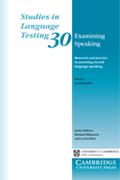
Examining Speaking: Research and practice in assessing second language speaking
Edited by Lynda Taylor (2011)
This edited volume develops a theoretical framework for validating tests of second language speaking ability. The framework is then applied through an examination of the tasks in Cambridge English Speaking tests from a number of different validity perspectives that reflect the socio-cognitive nature of any assessment event. The chapter authors show how an understanding and analysis of the framework and its components can assist test developers to operationalise their Speaking tests more effectively, especially in relation to the key criteria that differentiate one proficiency level from another. As well as providing an up-to-date review of relevant literature on assessing speaking, the volume also offers an accessible and systematic description of the different proficiency levels in second language speaking, and a comprehensive and coherent basis for validating tests of speaking. The volume will be of interest to examination boards who wish to validate their own Speaking tests in a systematic and coherent manner, as well as to academic researchers and students in the field of language assessment more generally.
“This edited volume provides useful information on how to apply a socio-cognitive theoretical framework of validity by illustrating research on Cambridge ESOL exams…[it] provides a broad picture with constructive examples for future researchers who want to apply this validity framework.”
Youngshin Chi (2013), Language Assessment Quarterly 10, 476-479
Download a free full pdf version of this volume
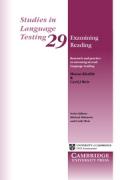
Examining Reading: Research and practice in assessing second language reading
Hanan Khalifa and Cyril J Weir (2009)
This volume develops a theoretical framework for validating tests of second language reading ability. The framework is then applied through an examination of tasks in Cambridge English Reading tests from a number of different validity perspectives that reflect the socio-cognitive nature of any assessment event. The authors show how an understanding and analysis of the framework and its components can assist test developers to operationalise their tests more effectively. As well as providing an up-to-date review of relevant literature on assessing reading, it also offers an accessible and systematic description of the key criteria that differentiate one proficiency level from another when assessing second language reading. The volume will be of interest to examination boards who wish to validate their own reading tests in a systematic and coherent manner, as well as to academic researchers and students in the field of language assessment more generally.
‘The book offers the field another splendid exposition on second language (L2) reading. This work is unique, however, in that it was written by two scholars who are quite familiar with the Cambridge suite of examinations, and they make extensive use of their knowledge of these tests to demonstrate how the Cambridge ESOL examinations implement theory and research in practice … This volume represents an important contribution to the field in terms of both theory and practice, its timeliness regarding several topics (e.g. alignment with the CEFR, computerized testing, among others), and its appeal to and relevance for multiple audiences.’
Craig Deville (2011), The Modern Language Journal 95, 334–335.
SiLT 29 was nominated as a runner-up in the prestigious Sage/ILTA 2012 award for the best book on language testing.
Order a copy
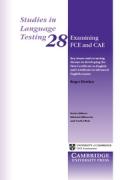
Examining FCE and CAE: Key issues and recurring themes in developing the First Certificate in English and Certificate in Advanced English exams
Roger Hawkey (2009)
This volume examines two of the best-known Cambridge English examinations – Cambridge English: First, also known as First Certificate in English (FCE) and Cambridge English: Advanced, also known as Certificate in Advanced English (CAE). It starts with the introduction of FCE (then the Lower Certificate in English) in 1939 and traces subsequent developments, including the introduction of FCE in 1975 and of CAE in 1991, as well as the regular projects to modify and update both tests. Key issues addressed are: test constructs; proficiency levels; principles and practice in test development, validation and revision; organisation and management; and stakeholders and partnerships. The book includes a unique set of facsimile copies of FCE and CAE test versions, from the original tests in 1939 and 1991 through various revision projects to the updated formats of 2008. The volume will be of interest to language testing researchers, academic lecturers, postgraduate students and educational policy makers, as well as to teachers, directors of studies, school owners and other stakeholders involved in preparing students for the Cambridge exams. This title complements previous historical volumes on CPE, BEC, CELS and IELTS.
Order a copy
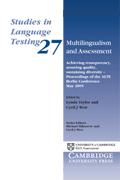
Multilingualism and Assessment: Achieving transparency, assuring quality, sustaining diversity – Proceedings of the ALTE Berlin Conference, May 2005
Edited by Lynda Taylor and Cyril J Weir (2008)
This collection of edited papers, based on presentations given at the 2nd ALTE Conference, explores the impact of multilingualism on language testing and assessment. The 20 papers consider ways of describing and comparing language qualifications to establish common levels of proficiency, balancing the need to set shared standards and ensure quality, and at the same time sustain linguistic diversity. The contributions come from authors within and beyond Europe and address substantive issues in assessing language ability today. Key features of the volume include: advice on quality management processes in test development and administration; discussion of the role of language assessment in migration and citizenship; and guidance on linking examinations to the CEFR, including some case studies. This volume is a valuable reference for academics and policy makers both within Europe and beyond, as well as a useful resource for practitioners seeking to define language proficiency levels in relation to the CEFR and similar frameworks.
“Overall the book provides well-selected papers with wide-ranging subject matters from the European community, which allows a glance into the challenging tasks the member countries are facing as they are adjusting to the concept of shared standards in language proficiency. The book will serve as timeless reference for testing professionals as it chronicles the tasks that have to be undertaken when 46 countries are involved in a task of this magnitude … The papers are important not only for the European member organisations (and the five observing countries: Canada, the Holy See, Japan, Mexico and the United States) but also for the assessment community in general, because they illustrate that with a clear mission and with dedicated researchers guided globalization can be beneficial to all.”
Zsuzsa Cziraky Londe (2010), Language Assessment Quarterly 7 (3), 280–283.
Download a free full pdf version of this volume
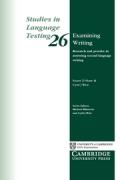
Examining Writing: Research and practice in assessing second language writing
Stuart D Shaw and Cyril J Weir (2007)
This volume describes the theory and practice of the Cambridge English approach to assessing second language writing ability. A comprehensive test validation framework is used to examine the tasks in Cambridge English Writing tests from a number of different validity perspectives that reflect the socio-cognitive nature of any assessment event. The authors show how an understanding and analysis of the framework and its components can assist test developers to operationalise their tests more effectively. As well as providing an up-to-date review of relevant literature on assessing writing, it also offers an accessible and systematic description of the different proficiency levels in second language writing. The volume will be of interest to examination boards who wish to validate their own Writing tests in a systematic and coherent manner, as well as to academic researchers and students in the field of language assessment more generally.
‘… it should be of interest to a wider audience as well for at least two reasons: (1) it provides a coherent, up-to-date summary of research on writing as a phenomenon in itself, as well as on the assessment of writing; and (2) it presents a great deal of practical information based on solid research that will be helpful in assisting others who are designing, evaluating, or wishing to improve upon their own assessment practices.’
Sara Cushing Weigle (2010), Language Testing 27 (1), 141–144.
Order a copy
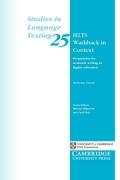
IELTS Washback in Context: Preparation for academic writing in higher education
Anthony Green (2007)
Based upon a PhD dissertation completed in 2003, this volume reports an empirical study to investigate the washback of the IELTS Writing subtest on English for Academic Purposes (EAP) provision. The study examines dedicated IELTS preparation courses alongside broader programmes designed to develop the academic literacy skills required for university study. Using a variety of data collection methods and analytical techniques, the research explores the complex relationship that exists between teaching and learning processes and their outcomes. The role of IELTS in EAP provision is evaluated, particularly in relation to the length of time and amount of language support needed by learners to meet minimally acceptable standards for English-medium tertiary study. This volume will be of direct interest to providers and users of general proficiency and EAP tests, as well as academic researchers and graduate students interested in investigating test washback and impact. It will also be relevant to teachers, lecturers and researchers concerned with the development of EAP writing skills.
Order a copy
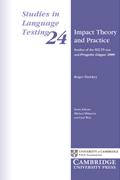
Impact Theory and Practice: Studies of the IELTS test and Progetto Lingue 2000
Roger Hawkey (2006)
This book describes two recent case studies to investigate test impact in specific educational contexts: one analyses the impact of IELTS (International English Language Testing System), while the second focuses on a major national language teaching reform programme introduced by the Ministry of Education in Italy. With its combination of theoretical overview and practical advice, this volume is a useful manual on how to conduct impact studies and will be of particular interest to language test researchers and students of language testing. It will also be relevant to those who are concerned with the process of curriculum and examination reform.
Download a free full pdf version of this volume
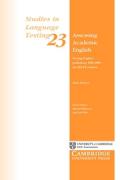
Assessing Academic English: Testing English proficiency, 1950–1989 – the IELTS solution
Alan Davies (2008)
This volume presents an authoritative account of academic language proficiency testing in the UK. It chronicles the early development and use of the English Proficiency Test Battery (EPTB) in the 1960s, followed by the creation and implementation of the revolutionary English Language Testing Service (ELTS) in the 1970s and 1980s, and the introduction of the International English Language Testing System (IELTS) in 1989. The book offers a coherent socio-cultural analysis of the changes in language testing and an explanation of why history matters as much in this field as elsewhere. It discusses the significant factors which impact on language test design, development, implementation and revision, and presents historical documents relating to the language tests discussed in the volume, including facsimile copies of original test versions. The volume will be of interest to language test developers and policy makers, as well as teachers, lecturers and researchers interested in assessing English for Academic Purposes (EAP) and in the role played by ELTS and IELTS.
Order a copy
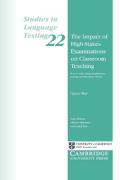
The Impact of High-stakes Testing on Classroom Teaching: A case study using insights from testing and innovation theory
Dianne Wall (2005)
This volume gives an account of one of the first data-based studies of examination ‘washback’. Through a detailed analysis of the impact of examination reform in one specific educational setting, it considers the effects of a test which was meant to serve as a lever for change, and describes how the intended outcome was shaped by factors in the test itself, as well as by features of the context, teachers and learners. The volume provides a helpful model for researching washback and impact as well as practical guidelines for the planning and management of change within an educational context. It is of particular relevance to all who are involved in the process of curriculum and examination reform, and to academic researchers, university lecturers, graduate students and practising teachers.
Order a copy
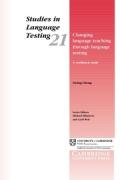
Changing Language Teaching through Language Testing: A washback study
Liying Cheng (2005)
This volume presents a study of how the introduction in 1996 of a high-stakes public examination impacted on classroom teaching and learning in Hong Kong secondary schools. The washback effect was observed among different stakeholder groups within the local educational context, and also in terms of teachers’ attitudes, teaching content and classroom interactions. The volume is of particular relevance to language test developers and researchers interested in the consequential validity of tests, as well as to teachers, curriculum designers, policy makers and others concerned with the interface between language testing and teaching practices.
Order a copy
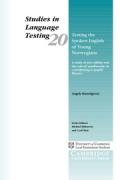
Testing the Spoken English of Young Norwegians: A study of test validity and the role of ‘smallwords’ in contributing to pupils’ fluency
Angela Hasselgreen (2004)
This volume reports on a study to validate a test of spoken English for secondary school pupils in Norway. The study included a corpus-based investigation of how conversational fillers or ‘smallwords’ contribute to spoken fluency. Findings from this work informed the development of rating scale descriptors for assessing fluency levels. The volume will be of particular interest to those concerned with the design and validation of spoken language tests, as well as those interested in features of spoken communication and in how classroom practice can help develop learners’ fluency.
Order a copy
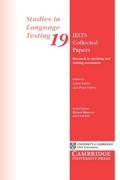
IELTS Collected Papers: Research in speaking and writing assessment
Edited by Lynda Taylor and Peter Falvey (2007)
This book brings together 10 research studies conducted between 1995 and 2001 under the auspices of the British Council/IELTS Australia Joint-funded Research Program. The studies – four on speaking and six on writing assessment – provided valuable test validity evidence and directly informed the revised IELTS Speaking and Writing tests introduced in 2001 and 2005. Volume 19 chronicles the evolution of the Writing and Speaking tests in ELTS/IELTS from 1980 to the present day and discusses the role of research in their development. In addition, it evaluates a variety of research methods to provide helpful guidance for novice and less experienced researchers. This collection of studies will be of particular value to language testing researchers interested in IELTS as well as to institutions and professional bodies who make use of IELTS test scores; it will also be relevant to students, lecturers and researchers working more broadly in the field of English for Academic Purposes.
“It is really a book which anyone concerned with performance testing should read and benefit from. At the very least, the literature reviews under each topic and the detailed explanations, then critique, of methods are excellent contributions to the field.”
Wayne Rimmer (2010) Modern English Teacher 19 (1), 91–92.
Order a copy
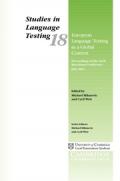
European Language Testing in a Global Context: Proceedings of the ALTE Barcelona Conference July 2001
Edited by Michael Milanovic and Cyril Weir (2004)
The ALTE Conference, European Language Testing in a Global Context, was held in Barcelona in 2001 in support of the European Year of Languages. The contents of this volume represent a small subset of the many presentations made at that event and papers were selected to provide a flavour of the issues that the conference addressed which included: technical dimensions of language testing; matters of fairness and ethics in assessment; aspects of education and language policy in the European context; and reports of recently completed research studies and work in progress.
Download a free full pdf version of this volume
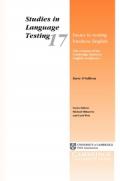
Issues in Testing Business English: The revision of the Cambridge Business English Certificates
Barry O’Sullivan (2006)
This book explores the testing of language for specific purposes (LSP) from a theoretical and practical perspective, with a particular focus on the testing of English for business purposes. A range of tests – both past and present – is reviewed, and the development of Business English testing at Cambridge English is discussed. The description of the revision of Cambridge English: Business Certificates, also known as Business English Certificates (BEC), in 2002 forms a major part of the book and offers a unique insight into an approach to large-scale ESP test development and revision. The volume will be of particular relevance to test developers and researchers interested in language testing for specific purposes and contexts of use; it will also be of interest to ESP teachers, especially those teaching English for business, as well as to lecturers and postgraduates working in the field of LSP.
Download a free full pdf version of this volume
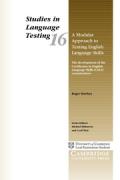
A Modular Approach to Testing English Language Skills: The development of the Certificates in English Language Skills (CELS) examinations
Roger Hawkey (2004)
This volume documents in some detail the development of the Cambridge English Certificates in English Language Skills (CELS), a suite of modular examinations first offered in 2002. The book traces the history of various important English language exams offered by UCLES and other examination boards which significantly influenced the development of CELS including: the Communicative Use of English as a Foreign Language (CUEFL) exams; the Certificates in Communicative Skills in English (CCSE); the English language tests of reading and writing produced by the University of Oxford Delegacy of Local Examinations; and the Oral English exams offered by the Association of Recognised English Language Schools (ARELS) Examinations Trust.
Order a copy
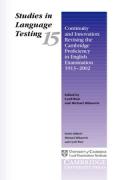
Continuity and Innovation: Revising the Cambridge Proficiency in English Examination 1913–2002
Edited by Cyril Weir and Michael Milanovic (2003)
This volume documents in some detail the most recent revision of Cambridge English: Proficiency, also known as Certificate of Proficiency in English (CPE), which took place from 1991 to 2002. CPE is the oldest of the Cambridge suite of English as a Foreign Language (EFL) examinations and was originally introduced in 1913. Since that time the test has been regularly revised and updated to bring it into line with current thinking in language teaching, applied linguistics and language testing theory and practice. The volume provides a full account of the revision process, the questions and problems faced by the revision teams, and the solutions they came up with. It is also an attempt to encourage in the public domain greater understanding of the complex thinking, processes and procedures which underpin the development and revision of all the Cambridge English tests, and as such it will be of interest and relevance to a wide variety of readers.
“An invaluable case book for training language testers and teachers … Makes explicit the developing philosophy of good testing practice … With its wealth of illustrative examples and detailed statistics, this study clearly presents an exceptional case study of a well-managed and professionally-serviced English language test … An important study, showing the possibilities of good language testing.”
Bernard Spolsky (2004) ELT Journal, 58 (3), 305–309.
Order a copy
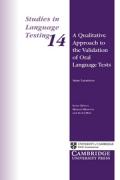
A Qualitative Approach to the Validation of Oral Language Tests
Anne Lazaraton (2002)
Language testers have generally come to recognise the limitations of traditional statistical methods for validating oral language tests, and have begun to consider more innovative approaches to test validation which can illuminate the assessment process itself, rather than just assessment outcomes (i.e. test scores). One such approach is conversation analysis (or CA), a rigorous empirical methodology developed by sociologists, which employs inductive methods in order to discover and describe the recurrent, systematic properties of conversation. This book aims to provide language testers with a background in the conversation analytic framework, and a fuller understanding of what is entailed in using conversation analysis in the specific context of oral language test validation.
“… this book provides an excellent, and clearly written, introduction to the use of discourse analysis, especially CA, in examining the functioning of oral language tests … I would recommend this book to teachers or test developers who might be developing oral language tests as well as those who are intending to carry out research using discourse analytic techniques. Finally, also, it must be said, the book was enjoyable to read; in particular I found Lazaraton’s discussion of the literature on oral interview research to be well-organised and clear, and her discussion of CA theory to be extremely accessible.”
Annie Brown (2005) Language Assessment Quarterly 2 (4), 309–313.
Order a copy
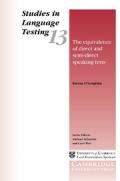
The Equivalence of Direct and Semi-direct Speaking Tests
Kieran O’Loughlin (2001)
This book documents a comparability study of direct (face-to-face) and semi-direct (language laboratory) versions of the Speaking component of the access: test, an English language test designed in the 1990s by the Language Testing Research Centre (University of Melbourne) as part of the selection process for immigration to Australia. The study gathered a broad range of quantitative and qualitative evidence to investigate the issue of test equivalence, and this multi-layered approach yields a complex and richly textured perspective on the comparability of the two kinds of Speaking tests. The findings have important implications for the use of direct and semi-direct Speaking tests in various high-stakes contexts such as immigration and university entrance. As such, the book will be of interest to policy makers and administrators as well as language teachers and language testing researchers.
‘... this book makes an important contribution to the language testing literature … For its insights and multifaceted approach to examining test equivalence, it is a valuable resource to language test developers, researchers, graduate students, and even language programs considering using either of these test formats ... a very readable tale of two tests and the complexity needed to unravel what actually happens in them.’
Lindsay Brooks (2006) Language Assessment Quarterly 3 (4), 369–373.
Download a free full pdf version of this volume
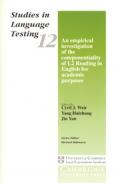
An Empirical Investigation of the Componentiality of L2 Reading in English for Academic Purposes
Edited by Cyril J Weir, Yang Huizhong and Jin Yan (2000)
This volume describes the development and validation of an advanced level test for evaluating expeditious (skimming, search reading and scanning) and careful EAP reading abilities at tertiary level in China. It reports on the methodological procedures which led to the development of the test and discusses the results of empirical investigations carried out to establish its validity both a priori and a posteriori. It is of particular interest and value to teachers, researchers and test developers.
“... this book is a systematic presentation of the authors’ dual-purpose pioneering work in EFL reading. On the one hand, they focus on the research question of the componentiality of academic EFL reading ... On the other hand, the researchers’ experimental work has rewarded them with a unique academic EFL reading test, whose development process is a wonderful model for other test developers to follow.”
Ning Chen (2006) Language Assessment Quarterly 3 (1), 81–86.
Download a free full pdf version of this volume
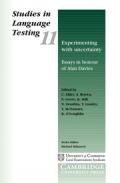
Experimenting with Uncertainty: Essays in honour of Alan Davies
Edited by C Elder, A Brown, E Grove, K Hill, N Iwashita, T Lumley, T McNamara, K O’Loughlin (2001)
This festschrift brings together 28 invited papers surveying the state of the art in language testing from a perspective which combines technical and broader applied linguistics insights. The papers, written by key figures in the field of language testing, cover issues ranging from test construct definition to the design and application of language tests, including their importance as a means of exploring larger issues in language teaching, language learning and language policy. The volume locates work in language assessment in a context of social, political and ethical issues at a time when testing is increasingly expected to be publicly accountable.
"The breadth of perspectives of [Experimenting with Uncertainty: Essays in honour of Alan Davies, Studies in Language Testing 11, Elder et al (Eds) (2001), CUP/UCLES] is wide enough, providing critically informative commentaries on the issues that language testers should be aware of, particularly in these times when assessment and accountability are increasingly valued in overall circles of education as well as the field of language testing … Providing a readable introduction … this book will guide … readers in how to grapple with thorny issues that language testing researchers may encounter in their professional career.”
Hyeong-Jong Lee (2005) Language Testing 22 (4), 533–545.
Order a copy
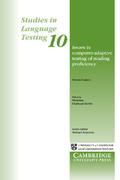
Issues in Computer-Adaptive Testing of Reading Proficiency: Selected papers
Edited by Micheline Chalhoub-Deville (1999)
This volume is an important resource for those interested in research on and development of computer-adaptive (CAT) instruments for assessing the receptive skills, mainly reading. It includes selected papers from a conference on the computer-adaptive testing of reading held in Bloomington, Minnesota, in 1996, as well as a number of specially written papers.
"For those interested in developing and appreciating CAT for reading measurement, the volume [Issues in Computer-Adaptive Testing of Reading Proficiency, Studies in Language Testing 10, Chalhoub-Deville (Ed.) (1999), CUP/UCLES] has, to date, had no parallel in its value as an excellent resource book.”
Jungok Bae (2005) Language Assessment Quarterly 2 (2), 169–173.
“[T]he chapters in this book represent state-of-the-art thinking in computer-adaptive language testing. The book will remain a key volume in the field for many years to come.”
Glenn Fulcher (2000) Language Testing 17 (3), 361–367.
Download a free full pdf version of this volume
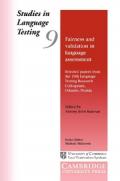
Fairness and Validation in Language Assessment: Selected papers from the 19th Language Testing Research Colloquium, Orlando, Florida
Edited by Antony John Kunnan (2000)
Fairness of language tests and testing practices has always been a concern among test developers and test users. In the past decade educational and language assessment researchers have begun to focus directly on fairness and related matters such as test standards, test bias and equity and ethics for testing professionals. The 19th annual Language Testing Research Colloquium held in 1997 in Orlando, Florida, brought this overall concern into sharp focus by having ‘Fairness in Language Testing’ as its theme. The conference presentations and discussions attempted to understand the concept of fairness, define the scope of the concept and connect it with the concept of validation of test score interpretation. The papers in this volume offer a first introduction to fairness and validation in the field of language assessment.
Order a copy
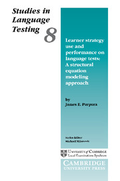
Learner Strategy Use and Performance on Language Tests: A structural equation modeling approach
James E Purpura (1999)
This volume investigates the relationship between learner strategy use and performance on second language tests, by examining the construct validity of two questionnaires designed within a model of information processing that measures test takers’ self-reported cognitive and metacognitive strategy use. The book investigates how learner strategy use influences test performance, and how high performers use strategies differently from low performers.
Order a copy
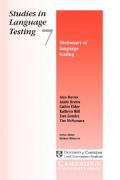
Dictionary of Language Testing
Alan Davies, Annie Brown, Cathie Elder, Kathryn Hill, Tom Lumley and Tim McNamara (1999)
This volume constitutes a valuable resource for anyone seeking a better understanding of the terminology and concepts used in language testing. It contains some 600 entries, each listed under a headword with extensive cross-referencing and suggestions for further reading. The selection of headwords is based on advice from specialists in language testing around the world, combined with the scanning of current textbooks in this field and of dictionaries and encyclopaedias in adjacent fields (e.g. psychometrics, applied linguistics, statistics).
"Multilingual Glossary of Language Testing Terms (Studies in Language Testing 6, ALTE [1998], CUP and UCLES) and Dictionary of Language Testing (Studies in Language Testing 7, Davies et al [1999], CUP/UCLES) are monumental works in the field of language testing.”
Yoshinori Watanabe (2005) Language Assessment Quarterly 2 (1), 69–75.
“... the book can act as a specific point of reference for language testing terminology and concepts, and students will find it increasingly useful as their understanding within the field develops.”
Roger Barnard (2000) Modern English Teacher 9 (3), 89–90.
Order a copy
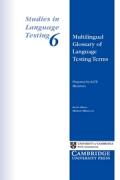
Multilingual Glossary of Language Testing Terms
Prepared by ALTE Members (1998)
A multilingual glossary has a particularly significant role to play in encouraging the development of language testing in less widely taught languages by establishing terms which may be new alongside their well-known equivalents in the commonly used languages. The glossary contains entries in 10 languages: Catalan, Danish, Dutch, English, French, German, Irish, Italian, Portuguese and Spanish. This volume will be of use to many working in the context of European languages who are involved in testing and assessment.
“… exploration of the MG reveals it, in my opinion, to be of real value in its own right, both as a working glossary of language testing terms, and, perhaps more importantly, as an invaluable aid to speakers of the ten represented languages … represents an invaluable resource for the tester and student of testing alike.”
Barry O’Sullivan (2002) Applied Linguistics 23 (2), 273–275.
Order a copy
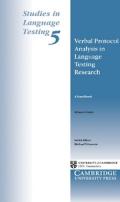
Verbal Protocol Analysis in Language Testing Research: A handbook
Alison Green (1998)
Verbal protocol analysis (VPA) is a methodology that is being used extensively by researchers. Recently, individuals working in the area of testing, and in language testing in particular, have begun to appreciate the roles VPA might play in the development and evaluation of assessment instruments. This book aims to provide potential practitioners of VPA with the background to the technique and a good understanding of what is entailed in using VPA in the context of language testing and assessment. Tutorial exercises are presented which enable the reader to try out each of the different steps involved in VPA.
"The book is successful in providing a practical guide for graduate students and researchers wishing a better understanding of VPA in language testing … it fulfils the need for a basic introduction to the application of VPA … a stimulating guide for researchers interested in language testing.”
Abdoljavad Jafarpur (1999) Language Testing 16 (4), 483–486.
Download a free full pdf version of this volume
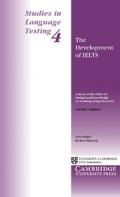
The Development of IELTS: A study of the effect of background knowledge on reading comprehension
Caroline Clapham (1996)
This book investigates the ESP claim that tertiary level ESL students should be given reading proficiency tests in their own academic subject areas, and studies the effect of background knowledge on reading comprehension. It is set against a background of recent research into reading in a first and second language, and emphasises the impact schema theory has had on this. The book is a useful resource for those involved with IELTS and others interested in the testing of English for academic purposes.
"Caroline Clapham has written a major, seminal book. She has examined a dangerous field of landmines, detected them, and disarmed them. This book will serve as a map of that minefield for years to come. Higher-education language departments … who are seriously considering special-fields testing should read this book carefully.”
Fred Davidson (1998) Language Testing 15 (2), 289–301.
Download a free full pdf version of this volume
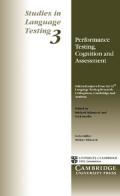
Performance Testing, Cognition and Assessment: Selected papers from the 15th Language Testing Research Colloquium, Cambridge and Arnhem
Edited by Michael Milanovic and Nick Saville (1996)
This book contains a selection of research papers presented at the 15th Annual Language Testing Research Colloquium (LRTC). The Colloquium was jointly hosted by the University of Cambridge Local Examinations Syndicate (UCLES) in Cambridge and CITO in Arnhem, the Netherlands. At the Cambridge venue, the papers were presented on the themes of performance testing, and at Arnhem they covered aspects of communication in relation to cognition and assessment. A selection of papers has been made in order to achieve a balanced coverage of these themes.
“The book thus provides a valuable resource for readers interested in a variety of approaches to investigating and understanding L2 performance assessment … a useful collection of research summaries and a source for relevant ideas.”
John Norris (1999) Language Testing 16 (1), 121–125.
Order a copy
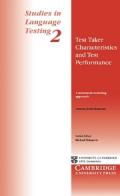
Test Taker Characteristics and Test Performance: A structural modeling approach
Anthony John Kunnan (1995)
This book investigates the influence of test taker characteristics on test performance in tests of English as a foreign language by exploring the relationships between these two groups of variables. Data from a test taker questionnaire and performance on several tests including Cambridge English: First, also known as First Certificate in English (FCE), and the TOEFL were used for the study.
Order a copy
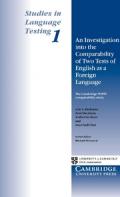
An Investigation into the Comparability of Two Tests of English as a Foreign Language: The Cambridge TOEFL Comparability Study
Lyle F Bachman, Fred Davidson, Katherine Ryan and Inn-Chull Choi (1995)
This book documents a major study, which compares Cambridge English: First, also known as First Certificate in English (FCE), with the Test of English as a Foreign Language (TOEFL) and investigates similarities in test content, candidature and use.
Order a copy